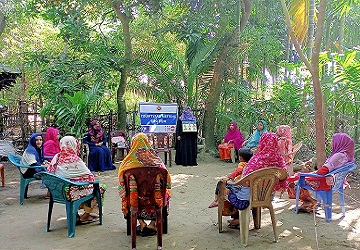International Journal of Environmental Research and Public Health
Article
Formative Research for Adapting the Cholera-Hospital-Based-Intervention-for-7-Days (CHoBI7) Water Treatment and Hygiene Mobile Health Program for Scalable Deliveryin Rural Bangladesh
Fatema Zohura 1,†, Tahmina Parvin 1,2,†, Kelly Endres 2, Elizabeth D. Thomas 2, Zakir Hossain 1, Kabir Hossain 1, Jahed Masud 1, Ismat Minhaj 1, Sawkat Sarwar 1, Jamie Perin 2, Mohammad Bahauddin 3, Md. Nazmul Islam 3,Sheikh Daud Adnan 3, Ahmed Al-Kabir 1, Abu S. G. Faruque 4 and Christine Marie George 2,*
- 1 Research, Training and Management International, Dhaka 1216, Bangladesh
- 2 Department of International Health, Johns Hopkins Bloomberg School of Public Health,Baltimore, MD 21205, USA
- 3 Bangladesh Ministry of Health and Family Welfare, Dhaka 1212, Bangladesh
- 4 International Centre for Diarrhoeal Disease Research, icddr,b, Dhaka 1212, Bangladesh
- * Correspondence: cgeorg19@jhu.edu; Tel.: +410-955-2485†These authors contributed equally to this work.
Abstract: The Cholera-Hospital-based-Intervention-for-7-Days (CHoBI7) mobile health (mHealth)program is a targeted water treatment and hygiene (WASH) program for the household members of diarrhea patients, initiated in the healthcare facility with a single in-person visit and reinforced through weekly voice and text messages for 3 months. A recent randomized controlled trial of the CHoBI7 mHealth program in urban Dhaka, Bangladesh, found that this intervention signi?cantly increased WASH behaviors and reduced diarrhea prevalence. The objective of this present study was to conduct formative research using an implementation science framework to adapt the CHoBI7 mHealth program for scalable implementation in rural Bangladesh, and to promote con-struction of self-made handwashing stations (CHoBI7 Scale-up program). We conducted a 3-month multi-phase pilot with 275 recipients and 25 semi-structured interviews, 10 intervention planning workshops, and 2 focus group discussions with intervention recipients and program implementers.High appropriateness, acceptability, and adoptionof the CHoBI7 Scale-up program was observed,with most recipients constructingself-made handwashing stations (90%) and chlorinating drinking water (63%) and 50% of participants observed handwashing with soap in the?nal pilot phase. ( see details journal - CLICK... )
-
Current Information
-
Activities Pictures
RTM International are implementing Health Support and research activities in the different Districts of Bangladesh which are funded by different Donors.
RTMI-UNFPA Project

Courtyard meeting organized by RTMI-UNFPA
